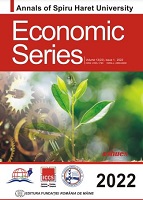The Effect of Oil Receipts and Fuel Subsidy Payment on the Current Account Deficit in Nigeria and Venezuela
The Effect of Oil Receipts and Fuel Subsidy Payment on the Current Account Deficit in Nigeria and Venezuela
Author(s): Mathew AdagunodoSubject(s): National Economy, Energy and Environmental Studies, Accounting - Business Administration
Published by: Editura Fundaţiei România de Mâine
Keywords: oil receipts; fuel subsidy payment; ARDL; current account deficit; Nigeria and Venezuela;
Summary/Abstract: The study assessed the effect of oil receipts and fuel subsidy payment on current account deficit in Nigeria and Venezuela. Data collected were analysed using trend analyses, unit root, cointegration techniques and Autoregressive Distributed Lag (ARDL). The result showed that estimated oil revenue had a negative and significant impact on current account deficit in the short- run in Nigeria (tc=-3.42; P<0.05) and Venezuela (tc=-2.97; P<0.05). The estimated oil revenue had a negative and significant impact on current account deficit in the long-run in Nigeria (tc=-3.96; P<0.05) and Venezuela (tc=-3.83; P<0.05) Fuel subsidies also had positive and significant long-run impact on current account gap in Nigeria (tc=3.40; P<0.05) and Venezuela (tc=3.58; P<0.05). The study concluded that despite the positive contributions of oil receipts to the current account in the two countries, continues fuel subsidy payment would impose significant fiscal costs and undermine current account position in Venezuela much more than Nigeria.
Journal: Annals of Spiru Haret University. Economic Series
- Issue Year: 22/2022
- Issue No: 1
- Page Range: 137-152
- Page Count: 16
- Language: English

